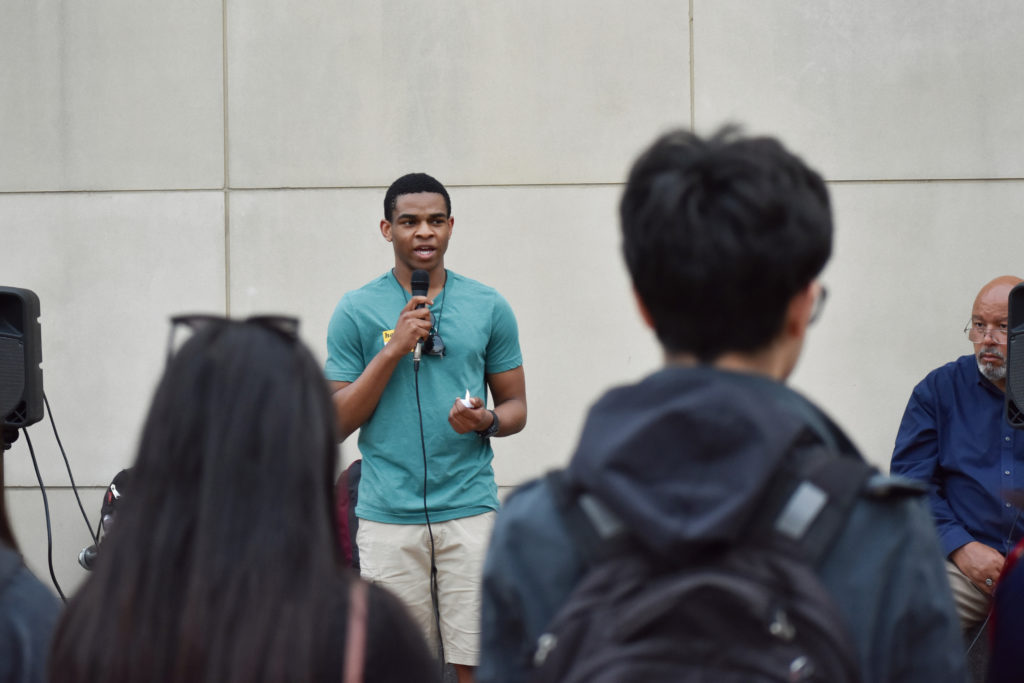More than 30 students gathered in Kogan Plaza Wednesday to remember the victims of bombings in Sri Lanka on Easter Sunday.
The vigil, organized by the GW Interfaith Council and GW Catholics, honored the casualties of a series of suicide bombings at Sri Lankan churches and hotels last week. Students observed a moment of silence for the more than 350 people killed and roughly 500 people injured in the attacks and heard from several speakers at the event.
Victoria Lewis, a senior and the president of the GW Interfaith Council, said she began planning the event last Monday. She said the vigil was an “incredible” way to bring students of diverse backgrounds together in the aftermath of tragedy.
“We tried to really coordinate an event that was beneficial for all different identities to process, so not just specifically mourning victims that were Christian and not specifically mourning victims that were people of color, but really kind of incorporating all of these different identities, all of these aspects to make a space that was inclusive and could really honor the lives that were lost,” Lewis said.
She said the Multicultural Student Services Center provided guidance and equipment, including a microphone and speaker system, to the organizers of the vigil.
MSSC Director Michael Tapscott said he and his organization were “glad” to support the vigil, which he said fostered a sense of solidarity.
“I’m happy to see that our kids are conscious of the challenges worldwide and that they are doing really positive things to help build community here,” he said.
Ethan Kelley, a senior and the secretary of the GW Interfaith Council, began the vigil with a prayer, asking God to bring his wisdom “upon leaders of nations to work for peace.”
“May you open hearts for those that contradict your will, that we may live in harmony,” he said. “Give us the grace to be united in truth and freedom and to always seek your will in our lives.”
Dan Ohiri, a junior studying political science and a member of the GW Interfaith Council, said he attended the event to support religious unity. He said people are “called to the best versions” of themselves in times of “darkness” and asked students of all faiths to support one another.
“I just wanted to remind you all that Easter is more than a single day, it’s an entire season and that the light that’s inside all of you that’s fueling you, that’s driving you, whichever faith you have, whatever God that you pray to – that that light fuels you and drives you to shine on the world throughout this entire season and for your entire lives,” he said.
Nimesh Wijewardane, a freshman majoring in political science whose parents are Sri Lankan immigrants, recited a poem he wrote. He said he was “devastated” by the deaths in Sri Lanka and hopes Sri Lankans will mourn and heal together and recognize one another as “children of the same mother.”
“I believe that my people are resilient, that love can overcome hate, that peace can overcome violence, that history – though brutal and tragic – need not be repeated,” he said.
Elmer Rajah, a senior majoring in biology whose parents are also Sri Lankan immigrants, said the news about the bombings did not stand out to him when he first heard about them because he had become “desensitized” to violence in the country, which he said is a “common occurrence.” He said that by the time he arrived at church for Easter Mass, he felt “disgusted and shameful and pathetic” about his reaction.
“I spent so many years of my life telling others that God was merciful and kind, that he was always with us and for the first time in my life, I felt like a fraud,” Rajah said. “I couldn’t celebrate Easter knowing that hundreds of families were going to sleep without their daughters, sons, brothers, sisters, fathers and mothers.”




